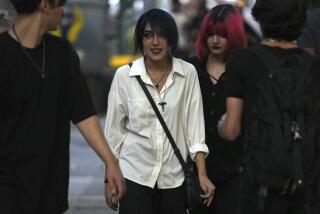Musharraf May Hold On to Uniform
- Share via
ISLAMABAD, Pakistan — Opposition parties walked out of parliament Thursday to protest the likelihood that President Pervez Musharraf will stay on as head of the Pakistani army and not step down as promised.
In recent weeks, Musharraf has said he believes the overwhelming majority of Pakistanis want him to continue as both president and head of the army. In an interview in Friday’s Washington Post, Musharraf said he might hold on to the army position because security conditions had changed since he promised to give up the uniform.
“It’s primarily the security of Pakistan, the internal conditions,” Musharraf told the newspaper, citing terrorist threats and battles over water resources. “There’s too much happening.”
Information Minister Sheik Rashid Ahmed had said Wednesday that Musharraf would continue in both posts, but retracted his statement hours later. Ahmed said he hoped that Musharraf would stay on, but that no decision had been made. Musharraf said Thursday that he had not made up his mind.
But most Pakistanis viewed Ahmed’s statement as the clearest hint yet that Musharraf, who seized power in a bloodless coup, already had decided to keep both posts.
Musharraf promised last year to give up the army post by the end of 2004 in exchange for support from a hard-line Islamic bloc in parliament.
On Thursday, opposition lawmakers tried to submit a motion criticizing Ahmed for his comments and condemning Prime Minister Shaukat Aziz, who has urged Musharraf to stay on as army chief. When the motion was disallowed, the opposition walked out in protest.
Raja Pervez Ashraf, leader of the opposition Pakistan People’s Party, said it was clear that Musharraf would not step down.
“This shows the contempt of the military toward the democracy,” Ashraf said. Musharraf “prefers to rule through the power of the gun rather than allowing the parliamentary democracy and rule of law to flourish in the country.”
Musharraf took power in October 1999, overthrowing the government of Prime Minister Nawaz Sharif. He formally declared himself president in June 2001 and extended his rule in a disputed referendum in April 2002. Though a pro-Musharraf coalition took power after parliamentary elections in October 2002, Islamic parties and lawmakers calling for a restoration of democracy have proved a fierce opposition.
Since the Sept. 11 terrorist attacks and the U.S.-led invasion of Afghanistan, Musharraf has emerged as a key figure in the fight against the Al Qaeda network and the search for its leader, Osama bin Laden. More than 500 suspects have been arrested in the campaign targeting militants who sought sanctuary along the Pakistani border.
The U.S. has embraced Musharraf and has given Pakistan billions of dollars in aid. But critics complain that it is being two-faced in backing the strongman while saying it wants to foster democracy, particularly in Islamic countries.
Musharraf’s anti-terrorism campaign and close cooperation with the U.S. have made some in this predominantly Muslim country leery. In December, Musharraf survived two assassination attempts, allegedly by Islamic militants.
Musharraf is scheduled to leave for the U.S. this weekend and is expected to meet with President Bush at the opening of the United Nations General Assembly in New York.
In Washington, State Department spokesman Richard Boucher said U.S. officials did not believe Musharraf had made a decision and were hopeful he would adhere to his pledge to step down from the army post.
“Our view, as expressed before, is that Pakistan’s long-term interest continues to be in a transition to a fully functioning democracy,” Boucher said. “We do expect to see continuing progress toward this goal, which is central to Pakistan becoming a moderate and modern Islamic state.
“President Musharraf had made many statements over his term in office in support of Pakistan’s continued path toward democracy. His vision for his country he describes as one of enlightened moderation. This is a vision for Pakistan’s future that we fully share.”
Pakistanis are divided over what Musharraf’s decision should be.
On Thursday, Prime Minister Aziz again urged Musharraf to stay on. “There is no clause in the constitution which bars the president from keeping both portfolios,” he told reporters in Islamabad.
At least one provincial assembly has joined the opposition in asking Musharraf to give up the army post. Some civic groups also oppose Musharraf continuing to hold both posts.
Tariq Mehmood Kiyani, president of the Supreme Court Bar Assn., Pakistan’s highest body for lawyers, criticized Musharraf.
The president “first unconstitutionally amended the constitution to get unprecedented powers and now it is evident that he is going to take another extra-constitutional step,” Kiyani said. “The lawyers community will resist the president’s decision and continue its struggle for the restoration of true parliamentary democracy in the country.”
Siddiqul Farooq of the Pakistan Muslim League, the party of former prime minister Sharif, accused Musharraf of betraying the nation.
“He will never allow true democracy in this country, and by opting to backtrack on his promise, it will prove to the world that he remains a military dictator. Gen. Musharraf lacks confidence and considers the uniform his savior,” Farooq said.
More to Read
Sign up for Essential California
The most important California stories and recommendations in your inbox every morning.
You may occasionally receive promotional content from the Los Angeles Times.













